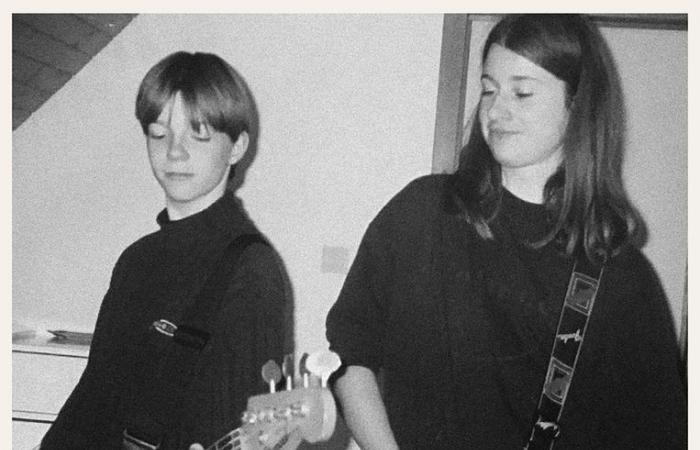At the end of 2018, Simon Casier’s older brother made a fatal fall down the stairs. With ‘Wish You Were Here’ the bassist of Balthazar brings a beautiful homage and musical eulogy of no less than 46 minutes. ‘Wannes instilled in me the love of music.’
“I wish there was nothing more than that I never had to make this music”, Simon Casier (36) sighs. “But at the same time I am glad that something beautiful could come out of my brother’s death. A bittersweet thought.” The bass player of Balthazar – and groom-to-be of singer Noémie Wolfs – performs the 46-minute long ‘Wish You Were Here’ from: an epic piece of music in memory of his deceased brother Wannes.
Almost simultaneously with the release of Balthazar’s long player Fever (2019) Casier’s older brother died after a fateful fall down the stairs. “For weeks he hovered between life and death, but it soon became clear that he would not make it. Wannes did not live to be older than 34 years. I was three years younger, but I have now caught up with him in age. I hate the idea that I am older than him today. That’s not how it should be. He was The Elder Brother in every way. I wanted to be a racing driver, but when I was eleven, Wannes taught me to play the guitar and instilled in me the love of music. I literally sing that on this record: ‘You taught me to play the guitar. Not the notes, but how to play from the heart.’ This song may be extensive in terms of duration, but it often sounds frugal and fragile.”
As fragile as life, Casier now also knows. “On every flight of stairs I unconsciously think of him. Absurd that such a banal accident had such far-reaching consequences. Wannes was a bon vivant who loved to travel. Full of fire he spoke about the trip to Japan that he once wanted to make. It never happened. If there’s anything I can learn from his early death, it’s ‘yolo’ – an ugly word, but for lack of a better expression it sums it all up: you only live once. Do you want to do something in your life, or not at all? Don’t put it off. His death also made me aware of the finiteness and relativity of everything: I let myself be much less rushed by trivialities. It also taught me that I shouldn’t put resolutions on the long track. For example, I always wanted to challenge myself by learning to play other instruments, such as the bugle and steel drum. You can now hear those instruments on ‘Wish You Were Here’.”
Funeral
Very cautiously and fragile, the funeral march starts. Every company has a subtly different timbre. Finally, you can’t keep it dry when a string orchestra erupts in grandeur. Only then does it dawn: the composition actually feels like a funeral ceremony. “Well noted, but I didn’t consciously start from that idea,” Casier asserts. “Before I knew it, I had ten minutes of music. And then I immediately felt what I wanted to write about. ‘Wannes Casier, wish you were here’ played through my mind and on that one sentence I based the entire text. The title is an obvious reference to the Pink Floyd classic of the same name. He was a really big fan, so I thought it was a fitting tribute. Now of course I’m afraid of all the disappointed Floyd fans who will buy my record. My apologies in advance (laughs). My brother loved prog rock, but also Velvet Underground and post rock à la Mogwai: that hypnotic and repetitiveness in their music also found its way into this music”.
Endless sadness seeps through on the record, but strangely enough it does not sound depressing. “Maybe because of the steel drum? It was intended to let some light pierce through the darkness, but that exotic sound does not appeal beach and cocktails think. It has something melancholic, I think. It wasn’t supposed to be pitch black anyway. That would not honor Wannes or his life.”
West Flemings bear the image of being fatteners. Did music make the grieving process easier? “Not always. Sometimes I even wanted to put the music in a drawer. Especially the singing was intense: for a month I locked myself in my home studio at night to sing everything in almost a whisper. Very confrontational. But at the same time, the recordings were often cathartic.”
“I don’t always want to talk about my brother, but a few months ago I had a long and good conversation with Jeroen Meus, who also lost his brother. I don’t know Jeroom, but by his program Boris I also have a lot. And in Gert-Jan (Van Hellemont, GVA) I also found a sounding board with whom I play in Douglas Firs: he wrote his last album between death and childbirth. He knew he would become a father when his mother had only weeks to live. I find it remarkable how everyone deals with death in a completely different way: Jeroen speaks to his brother via a dictaphone, Jeroom makes his brother’s dream trip and I write music because no world traveler or great talker has been lost to me. You can also notice that in the text on the plate: it is written down very factually, without poetic frills. The whole story of my brother and me can be found in the text.”
There is life pre-Wannes and post-Wannes, Casier believes. “Everything has changed since his death. The grieving process is not over yet, I notice. And I don’t think the sadness will ever completely go away. Fortunately, I learn to live with it a little better every day.”
‘Wish You Were Here’ will be released on Friday at PIAS. Zimmerman performs the music during M-Idzomer in Leuven on July 29.






